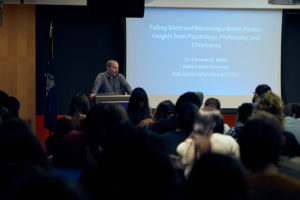Philosophy Minor
Survey the central ideas of the major philosophers, such as Plato and Aristotle; Augustine, Anselm, and Aquinas.
The philosophy minor surveys the central ideas of the major philosophers, such as Plato and Aristotle; Augustine, Anselm, and Aquinas; and Descartes and Locke, preparing students to read carefully, critically consider the implications of ideas, and make fine distinctions.
The Philosophy minor builds upon the philosophical preparation of the core curriculum (Foundations of Philosophy and Ethics). Students study the central ideas of the major philosophers, such as Plato and Aristotle in Ancient Philosophy; Augustine, Anselm and Aquinas in Medieval Philosophy; and Descartes and Locke in Modern Philosophy. Students must also take one 300- or 400-level philosophy elective. The philosophy minor prepares students to consider the nature of God, the nature of creatures, and the ways in which God superintends His creation. Students are also challenged to understand the relationships that both God and creatures bear to moral goodness and evil.
Required courses
- Foundations of Philosophy; Ancient Philosophy; Medieval Philosophy; Modern Philosophy; Ethics; one Philosophy elective (300/400 level)
Exceptions
- Students majoring in Humanities may not minor in History, Literature, or Philosophy.
- Students majoring in Religious and Theological Studies may not minor in Philosophy or Theology.
- Students majoring in Politics, Philosophy, and Economics may not minor in Economics, Philosophy, or Politics.
- Students majoring in Philosophy may not minor in Philosophy.
For full course codes, see the course catalog.





